Money, The Environment, and False Positives: Is Saliva Screening Worth The Hassle?
Among the pandemic’s changes to Latin student life has been the requirement to spit into a small plastic tube each Wednesday and transport it to school. However, with more than 90% of the faculty vaccinated, and more students receiving the vaccine every day—especially given the FDA’s recent approval of the Pfizer vaccine for children ages 12-15—the community is beginning to debate the future of the weekly saliva testing.
Latin’s medical task force has decided the safest option is to see the weekly screening out through the rest of the school year.
After freshman Zoe Larsen recovered from COVID-19, however, she became exempt from the saliva screening. “I am in the period where my antibodies are still effective, so I don’t have to take a saliva test,” she said. Zoe already had the virus, and her antibodies will be active until school ends in June.
So why, especially given that individuals who had the virus are excused from saliva screening, are those who have been vaccinated still required to participate?
One of the main reasons provided by Latin was that the testing kits for the month of May have already been distributed. Additionally, of the three vaccines that have been FDA approved, not one of them is 100% effective, and therefore people are still able to get infected. That said, the vaccine has significantly reduced hospitalizations and the severity of illnesses. On April 15, The Wall Street Journal reported that only .008% of vaccinated individuals are catching the virus. Before the vaccine was circulating, there was a constantly changing positivity rate ranging from 5-20%.
Latin parent and gastroenterologist Dr. Greg Cohen said, “That means that the prevalence of COVID in fully vaccinated groups is .008%. That is a very low number. That starts to strain the accuracy of any test no matter how accurate it is.” The testing company Latin works with, SafeGuard Surveillance, provides tests with an 83.2% accuracy rate. Comparatively, a rapid strep throat test is 95% accurate.
Dr. Cohen pointed out that a year ago, when the pandemic was in full force, any type of positive test would most likely be accurate. However, “when the prevalence of the disease starts to be lower and lower, it crosses the threshold that no matter how accurate the test is, the disease is so uncommon that most positive tests are likely to be a false positive,” he said.
“In a fully vaccinated population, being generous about the accuracy of saliva testing, there is a 0.75% chance that a fully vaccinated person with a positive saliva test has the disease,” he said.
Lower School nurse and oncology nurse at Lurie Children’s Hospital Rebekah Maloney takes a different approach than Dr. Cohen. She favors continued screening because people who have been vaccinated can and do still get COVID. Additionally, she has seen five individuals contract the virus after being fully vaccinated. “I fully support [continuing the testing]. It is low-risk and low-cost. I like to look at something from a risk-benefit analysis. I think that there is not much risk in people continuing to do the saliva screenings for the next four weeks of school. It could pick up mildly symptomatic or asymptomatic people who might bring COVID-19 into our school.”
According to Chief Financial Officer Michael Szczepanek, the school spends roughly $13,000 on tests each week. With approximately 22 weeks of testing, the school has spent $299,000 on screening alone. This year, however, the school devoted an even larger portion of the budget to COVID-19 resources. “It was saliva screening, but also facilities updates,” said computer science teacher and member of the Upper School Leadership Team Ash Hansberry. “The budget was all rearranged to make specific COVID funds. I don’t think it is the case that we took money from one thing and said, ‘Oh, now it’s saliva screening.’”
Latin grandparent Dr. Steven Gould, a retired vascular surgeon, agreed with Nurse Maloney’s sentiments on continuing the testing. “I think that it is worth it, because I believe we are talking short term here,” he said. “In the coming months, we will get more information because of studies. If we find out that the likelihood of a vaccinated person transmitting disease is low, I would say no for a whole variety of reasons: the environment, cost, and so on.”
Dr. Gould expressed his agreement with the plans of the President’s chief medical advisor, Dr. Anthony Fauci, throughout the pandemic: Stay as cautious as possible until we have more information.
As of now, Latin’s medical task force is beginning to look into discontinuing saliva screening for fully vaccinated faculty and staff. “We are talking about people who have no symptoms and no known exposures,” said Latin’s Senior Medical Consultant Dr. Leslie Cordes. “We have a very highly vaccinated faculty and staff population.” Students, however, have not been able to access the vaccine as easily until recently.
“We have to be mindful that we still have a moderate to high level of transmission in the community. Numbers have been coming down, but we are still above the threshold of 15 cases per 100,000.”
While they have not made any final decisions yet, the medical task force has decided that if Latin faculty and staff opt out of testing, the school will not require them to show proof of vaccination, because as of now, they do not have an organized way to monitor vaccinations among the Latin community. “The State of Illinois gives us very clear guidelines on how to gather immunization records,” said Ms. Maloney. “Those go through your pediatrician, and your parents upload it to Magnus. That is a much more reliable way to collect information. We haven’t gotten guidance from the State of Illinois on how to verify [COVID-19 vaccination cards] are authentic.”
Ms. Maloney is referring to the falsified vaccination cards that have begun to sell online. As of now, the school is not mandating the vaccine for students or faculty, but they are asking for transparency about it. However, seniors who have been vaccinated were asked to upload photos of their vaccination cards onto a form for their in-person Prom.
New Trier Township High School also has been collecting saliva samples since October. Unlike Latin, though, faculty and staff are not required to submit them; however, it is highly recommended, and students have to in order to participate in any in-person activities. “[Vaccinated teachers] are no longer strongly encouraged to do it, but they appreciate those of us who do,” said New Trier Hebrew teacher Kim Hafron. “Students will still have to submit, because it would be too hard to monitor whether students are vaccinated because our school is so huge.” New Trier has 4,000 students, compared to Latin’s 1,186.
“I get the whole ‘PCR tests aren’t that effective,’ but we know that vaccinated individuals can still get COVID,” said senior and co-head of the Green Group Maya Gray. “It happened in the senior class. I still feel I should take the saliva test, even though I am fully vaccinated. So many people in our age group are asymptomatic, and there is just no way to know. Even if it is not the most effective thing, I’d rather be safer than accidentally get someone sick.”
But Maya identified what she views as the biggest problem she sees in saliva screening: the impact on the environment. To complete the test, you must spit into a polypropylene tube through a straw, and then transport it to school in a plastic bag. A plastic bag takes over 500 years to degrade.
Latin has done approximately 22 weeks of saliva screening, with an average of 1,200 tests per week. Thus far, it follows that the community has used 26,400 plastic bags, polypropylene tubes, and straws.
While the production of polypropylene is, overall, not too harmful towards the environment, Maya still believes it is not necessary for a vaccinated individual to use such a vast amount of single-use plastic.
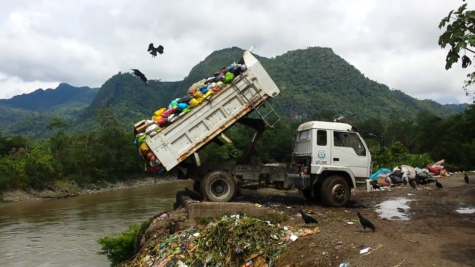
On the other hand, a single day in the hospital produces an astonishing amount of waste, making the impact of the saliva tests look minimal. “It is probably way more environmentally friendly to test” than to add a single patient day in the hospital, said Dr. Cohen. The amount of waste after a day in the hospital is “mind boggling.”
It seems, though, that most Latin students, especially freshmen who have not been able to get the vaccine yet, are still in favor of saliva testing.
Freshman Julian Lopez said, “I think that, at least for the unvaccinated people, it is an adequate use of resources. Especially now that we are completely in person.”
Junior Arjun Singh agreed, saying, “There is always a small percent chance that someone could catch the virus, so having a screening in some form or another is the safest, especially with us fully being in person. I, however, do think that if there are more efficient and more environmentally conscious alternatives to saliva tests then yes, I am 100% on board.”
Christian Prendergast, a freshman, offered a counter-argument. “I don’t really think we need it anymore, because over the past however many months there have only been like one or two positive cases a week,” he said. “It just seems really expensive, and we might not need it because case rates are going down.”
Latin will continue the screening for the rest of the school year, regardless of the issues raised with positive predictability rates, budgetary concerns, and the environment. “Thinking about the fall, I think it should be re-evaluated,” said Mx. Hansberry. “With more people vaccinated, I don’t think the benefits are going to outweigh the money and the plastic. It is too hectic of a time to go changing things this year.”

Eliza Lampert (’24) is a senior at Latin and is overjoyed to serve as one of this year’s Editors-in-Chief. During her time writing for The Forum, she...














































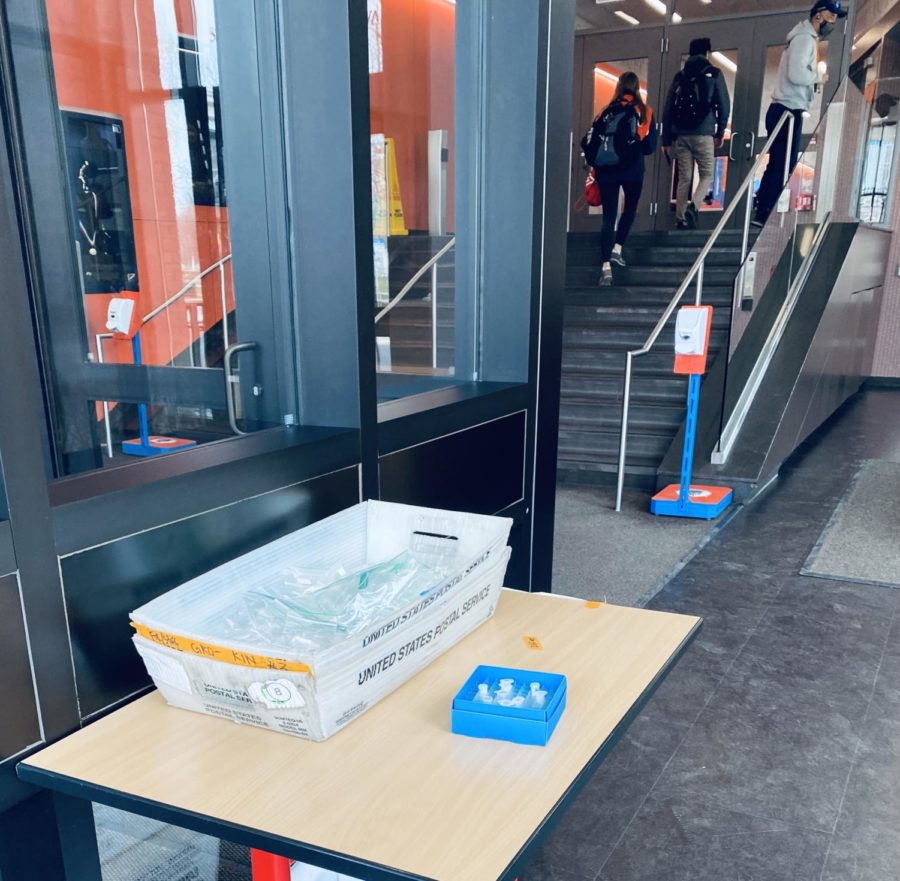
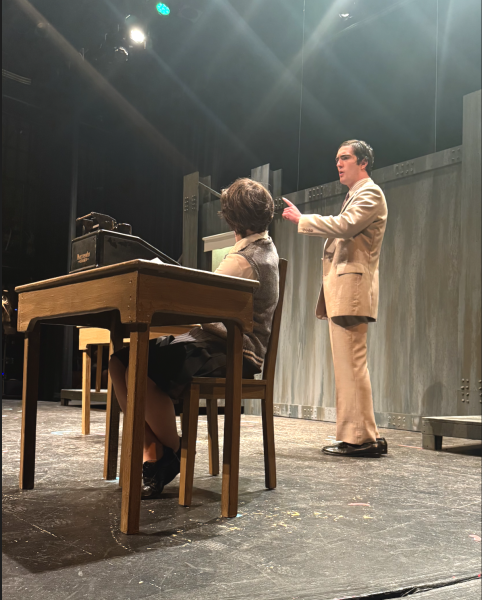
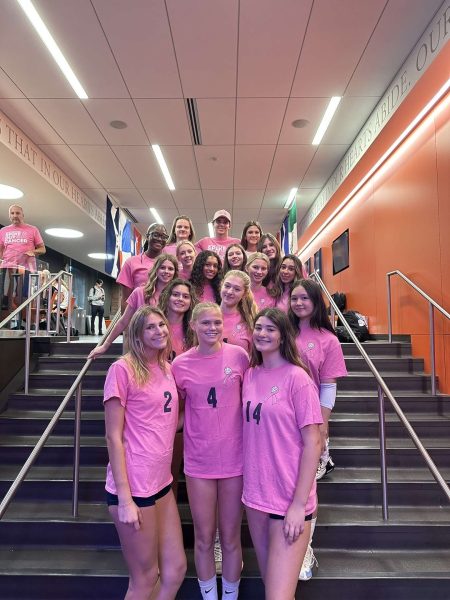
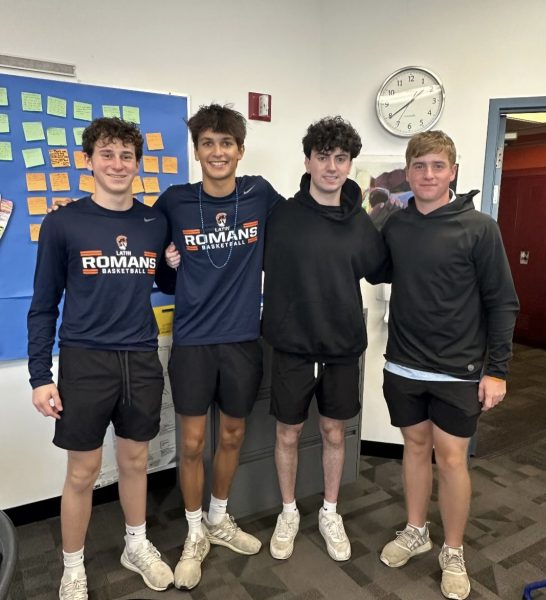
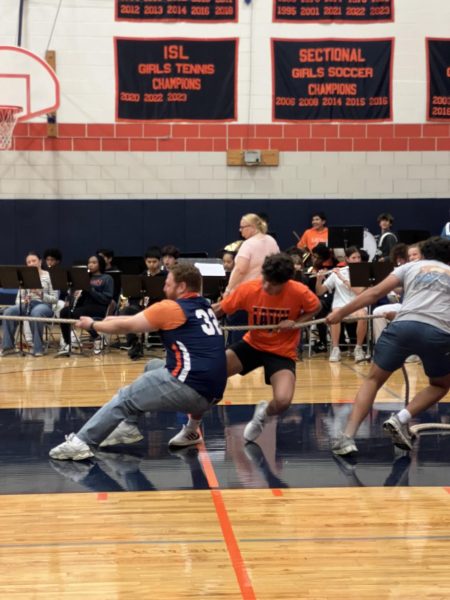
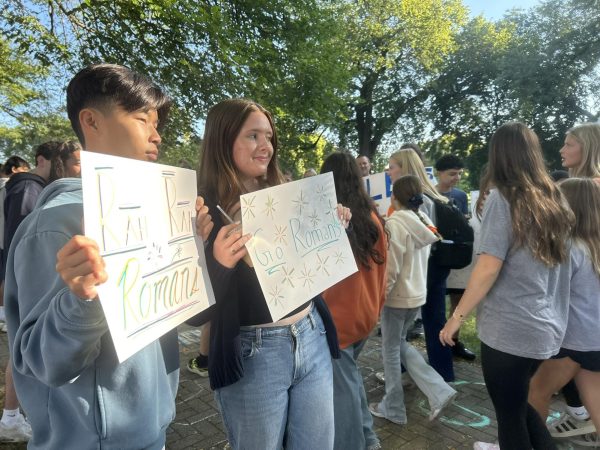

Gabriel Di Gennaro • May 18, 2021 at 12:59 pm
Thanks for incorporating a variety of voices and angles into this article, Eliza. I enjoyed reading it!